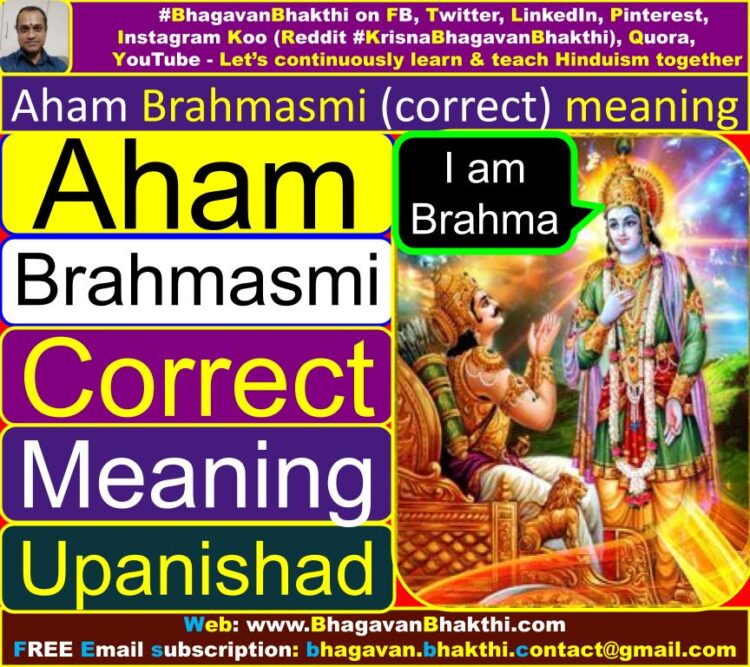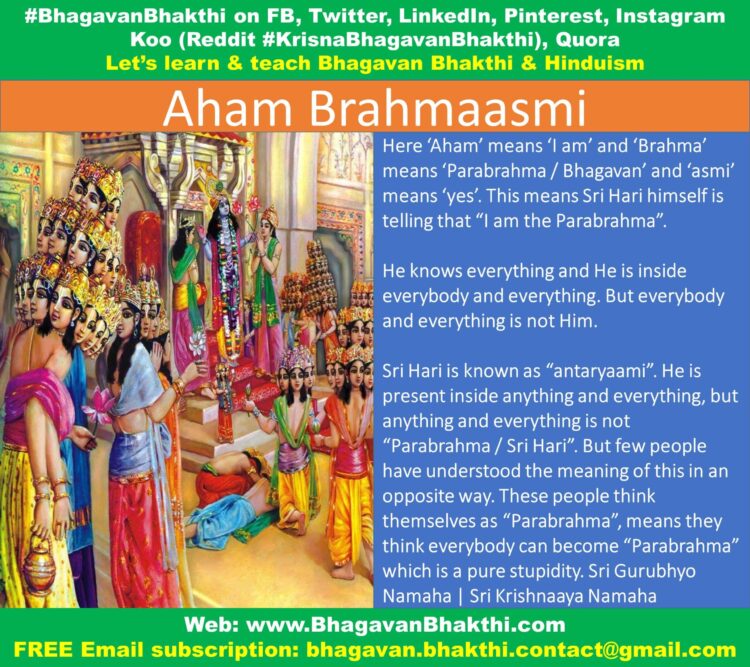What is Aham Brahmasmi (correct) meaning (Brihadaranyaka Upanishad)
Namaste friends, how are you doing today? Welcome to #BhagavanBhakthi website / blog.
Bhagavan Lord Sri Vishnu (Krishna) (Rama) blessings to you and your family!
In this website / blog, you will always learn about #Hinduism #Sanskrit language.
Also subscribe to my YouTube channel from this link #BhagavanBhakthi to view videos about #Hinduism #Sanskrit language.
Just before going to “What is Aham Brahmasmi (correct) meaning (Brihadaranyaka Upanishad)“, let us have some brief information.

Hinduism (Sanatana Dharma) was started by Lord Sri Vishnu and he is the founder of the same.
No one knows the exact time frame of starting of this great Sanatana Dharma (Hinduism), as this is existing since ‘adi kalam‘ (Grand unknown age) and will stay until the ‘ananta kalam‘ (Grand infinite age).
We are Bharata vaasis (Indians) should be highly proud of this to be born in the most divine and greatest country India (Bharata) (Bharat).
Now, let’s move to our main question “What is the (correct) meaning of Aham Brahmasmi“. Let us learn about the correct meaning of the same now.
My dear friends, first let us know the simple meaning, later let us take the shloka (sloka) (hymn) of:
“Aham Brahmasmi” from Brihadaranyaka Upanishad and let us understand the inside meaning of the same.

What is the (correct) meaning of “अहं ब्रह्मास्मि / ಅಹಂ ಬ್ರಹ್ಮಾಸ್ಮಿ / ahaṁ brahmāsmi /aham brahmasmi”.
Does ‘I’ mean “Paramatma (Supreme Soul) / Brahma / Bhagavan / God” or the meaning is something else?
Let us learn this now:
Aham Brahmasmi meaning : Here ‘Aham’ means ‘I am the Paramatma (Supreme Soul)’ and ‘Brahma’ means ‘Parabrahma / Bhagavan / God’ and ‘asmi’ means ‘yes’.
This means, Lord Sri Hari (Vishnu) himself is telling that “I am the Parabrahma” (I am the Supreme Soul / God).
Lord Sri Hari or Lord Sri Narayana or Lord Sri Vishnu or Lord Sri Rama or Lord Sri Krishna or any of his avatar (s) knows everything and He is inside everybody and everything.
But, everybody and everything is not Lord Sri Vishnu. Lord Sri Hari (Vishnu) is known as “antaryami”.
Here “antaryami” means, Lord Sri Vishnu is present inside anything and everything, but anything and everything is not “Parabrahma / Lord Sri Hari / God”.
But few people have understood the meaning of this in an opposite way, which is completely against the Sanatana Dharma (Hinduism) Texts.
These people think themselves as “Parabrahma” (Lord Sri Vishnu) (God), that is –
they think everybody can become “Parabrahma” (Lord Sri Vishnu) (God), which is a pure stupidity and nothing else.
Meaning of “Aham Brahmasmi” as per Brihadaranyaka Upanishad is as given below:
ब्रह्म वा इदमग्र आसीत्, तदात्मानमेवावेत् ‘अहं ब्रह्मास्मि’ इति । तस्मात् तत् सर्वमभवत् ॥ – बृहदारण्यक उपनिषत् 1-4-10
ಬ್ರಹ್ಮ ವಾ ಇದಮಗ್ರ ಆಸೀತ್, ತದಾತ್ಮಾನಮೇವಾವೇತ್ ’ಅಹಂ ಬ್ರಹ್ಮಾಸ್ಮಿ’ ಇತಿ । ತಸ್ಮಾತ್ ತತ್ ಸರ್ವಮಭವತ್ ॥ – ಬೃಹದಾರಣ್ಯಕ ಉಪನಿಷತ್ 1-4-10
brahma vā idamagra āsīt, tadātmānamēvāvēt ’ahaṁ brahmāsmi’ iti। tasmāt tat sarvamabhavat॥ – Brihadaranyaka Upanishad 1-4-10
Meaning of this shloka (hymn) : The ‘Bhagavat Tattva’ (The essence of the Lord) which was the only thing present before srushti / creation, thought about itself.
That Bhagavat Tattva thought itself as “Aham Brahmasmi”, and resonated with paripurnata (परिपूर्णता) (paripūrṇatā) / completeness.
In the above shloka (hymn) first of all, when it is said that ‘Bhagavat Tattva’ (The essence of the Lord) alone existed before creation,
it doesn’t mean that the other ‘जीव / jeevas’ (living beings) or ‘निर्जीव / nir-jeevas’ (non living beings) did not exist.
Off course they all existed, but were of no use at all, because they were made dormant in nature.
Both jeevas (living beings) and nir-jeevas (non-living beings) had become ‘निष्क्रिय / nishkriya’ (inactive), as the Lord Sri Vishnu had not desired to get them active.
Thus, as per the above shloka (hymn) it means that only the ‘Bhagavat Tattva’ was active before the creation.
Secondly, Lord Sri Vishnu is ‘परिपूर्ण / paripurna’ (perfectly complete) and from ‘adi kalam’ (grand unknown time) he is perfectly complete and that’s why he is called as ‘Brahma’ (God).
Thus clearly shows that, there was nothing new for him to think upon or to understand something new.
Then what did the Lord Sri Vishnu meant when he said ‘aham brahmasmi’.
Lord Sri Vishnu is saying that, he himself is ‘AHAM‘, he himself is ‘BRAHMA,’ and he himself is ‘ASMI‘.
Here ‘AHAM‘ means ‘Bhagavan / Lord Sri Vishnu‘. Here ‘AHAM‘ is showing the ‘अन्तर्यामित्व / antaryamitva‘ of the Lord Sri Vishnu, that is –
it is pointing out that no ‘jeevas (living beings) and nir-jeevas (non-living beings)‘ can remain without him.
Lord Sri Vishnu is the antaryami in every jeevas (living beings) and nir-jeevas (non-living beings).
[Note : Antaryami means, the Lord Sri Vishnu who is present inside of anything and everything (divinely present inside of us).]
[Antaryamitva means, Lord Sri Vishnu is present inside of us, that is, intrinsically and divinely present in anything and everything.]
Here, ‘BRAHMA‘ means, Bhagavan (Lord Sri Vishnu) (God) is ‘परिपूर्ण / paripurna‘ (perfectly complete), ‘jnana-anandamaya / ज्ञान-आनन्दमय‘ (fully knowledgeable with highest ease).
Here, ‘ASMI’ means, Bhagavan (Lord Sri Vishnu) (God) is ‘नित्य निर्विकार / nitya nirvikaara’ (Never deformed / disturbed / distorted).
That is, Lord Sri Vishnu (God) never-ever can be deformed or disturbed or distorted, etc. He is not at all affected by anything or anyone.
Lord Sri Vishnu can’t be changed at all by anyone or anything. He will always be in ‘एकरूप / Ekaroopa’ (Highly stable / firm / steady / hard / solid).
For this reason, Lord Sri Vishnu himself thought that he is “AHAM BRAHMASMI”, that is –
he being the ‘antaryami’ (divinely present) of all jeevas and nir-jeevas is ‘paripoorna / perfectly complete’ and nirvikara (never distorted).
So, when the ‘Brihadaranyaka Upanishad’ talks about the Lord Sri Vishnu thinking of himself as ‘AHAM BRAHMASMI‘,
where does the question arise of any other ‘jeevas (living beings) or nir-jeevas (non-living beings)’ becoming Brahma (God)?
Heights of misinterpretation by the foolish and stupid people should not at all be counted upon.
When this above shloka (hymn) about “Aham Brahmasmi” is not said by any other living being, rather it is Lord Sri Vishnu himself who utters the phrase,
then how come any other living and non-living being can become Lord Sri Vishnu (Brahma) (Paramatma) (God).
Thus, how does the above shloka (hymn) can relate to any ‘jeevas / living beings’ or ‘nir-jeevas / non-living beings’?
We should always do the chintana (divine meditation) of the supreme Lord Sriman Narayana (Vishnu) (Krishna) (Rama) as:
‘सर्व-अन्तर्यामी / sarva-antaryami’ – Divine present inside anything and everything,
‘परिपूर्ण / paripurna’ – Perfectly complete and
‘निर्विकार / nirvikara’ – Can never be distorted or deformed or disturbed.
Above explanation helps even the ordinary human in achieving our ‘स्व-योग्य-परिपूर्णता / swa-yogya paripurnata‘, that is, Self-worthy completeness in Moksha (Liberation).
This doesn’t mean that ‘I’ or ‘you’ or ‘other living being(s)’ or ‘other non-living thing(s)’ can become equal to:
Brahma (Paramatma) (Lord Sri Vishnu) (God) in ‘परिपूर्णता / paripurnata‘ (perfectly complete) as few foolish people have given explanation about ‘Aham Brahmasmi‘.
But, what we are ‘yogya / qualified‘ for, we can definitely achieve / attain / realize / accomplish / execute that.
For example, in our house if we have a tank, a bucket, a tumbler, etc. which are empty, when we fill them with water they are said to be either fully filled or partially filled as per the quantity of water inside it.
But, the perfectly completeness (filling of water) of the tank or bucket or tumbler is not the same in all, as the completeness of the each of the utensil is different as per it’s volume of consumption.
Similarly, in Moksha (Liberation) every living being attains liberation as per his capability.
Thus, we can finally come into a conclusion that, ‘AHAM BRAHMASMI‘ doesn’t mean a living or non-living being, but rather it is Lord Sri Vishnu (Brahma) (Paramatma) himself.
We should always be far away from people who misinterpret the great and divine meaning of the Sanatana Dharma Shastras (Hindu Texts).
More information will be added to this on regular basis, please visit after some time to know more information.
To watch videos on #Hinduism #Sanskrit language, SUBSCRIBE to my YouTube channel from this below link:
#BhagavanBhakthi YouTube channel
To know more about “Hinduism (Sanatana Dharma) information, facts, significance, importance, etc.“, please click the below link:
Hinduism (Sanatana Dharma) information, facts, significance, importance, etc.
More information will be added to this. Please visit after some time.Dear friends, if you need any clarifications about this post, kindly let me know, I will definitely try to answer all of them.
Also your one LIKE, one COMMENT, One Share, one SUBSCRIPTION is highly important.
This will help to know the quality of this content and also it will be helpful to know if any improvements is required for the content.
If you feel this content is useful to you and has helped you to improve your knowledge, kindly share this with your well-wishers.
Because “SHARING MEANS CARING”.
For receive FREE EMAIL SUBSCRIPTION about #BhagavanBhakthi, you can send an email to bhagavan.bhakthi.contact@gmail.com from your email ID.
NAMASTE!
Sri Gurubhyo Namaha
Sri Krishnaaya Namaha
Sri Krishnaarpanamastu
What a beautiful and meaningful phrase! Thank you for sharing it.
Just amazing..do we have antipramana for aham means Lord Vishnu?
This post beautifully unpacks the profound meaning of “Aham Brahmasmi” from the Brihadaranyaka Upanishad. It’s inspiring to see how such ancient wisdom continues to resonate in our spiritual journeys today. Thank you for sharing these insights!
This post beautifully unpacks the profound meaning of “Aham Brahmasmi.” It’s fascinating to see how these ancient teachings from the Brihadaranyaka Upanishad resonate with modern spirituality. Thank you for bridging these concepts with devotion to Bhagavan in Hinduism!
This post beautifully captures the essence of “Aham Brahmasmi” from the Brihadaranyaka Upanishad. It’s fascinating how this profound concept reflects the interconnectedness of the individual and the universal. The insights shared provide a deeper understanding of Bhagavan Bhakthi in Hinduism. Thank you for shedding light on such a significant aspect of spiritual philosophy!
Thank you for this insightful exploration of “Aham Brahmasmi.” It’s enlightening to see how this profound realization connects with Bhagavan Bhakthi in Hinduism. The depth of the Brihadaranyaka Upanishad truly resonates, and your commentary helps clarify its significance in our spiritual journey.
This post beautifully captures the profound essence of “Aham Brahmasmi.” The connection between the individual and the universe is truly enlightening. I appreciate how you’ve tied it back to the teachings of the Brihadaranyaka Upanishad. It’s a reminder of our intrinsic divinity and unity with Brahman. Thank you for sharing such valuable insights!
This post beautifully captures the essence of “Aham Brahmasmi.” It’s fascinating how the Upanishads convey such profound truths about our connection to the universe. Thank you for shedding light on this concept and its significance in Hindu philosophy!
This post beautifully captures the essence of “Aham Brahmasmi.” It’s fascinating how the Upanishads convey such profound truths about the self and the universe. Your insights into Bhagavan Bhakthi deepen my understanding of this concept and its relevance in our spiritual journey. Thank you for such an enlightening read!